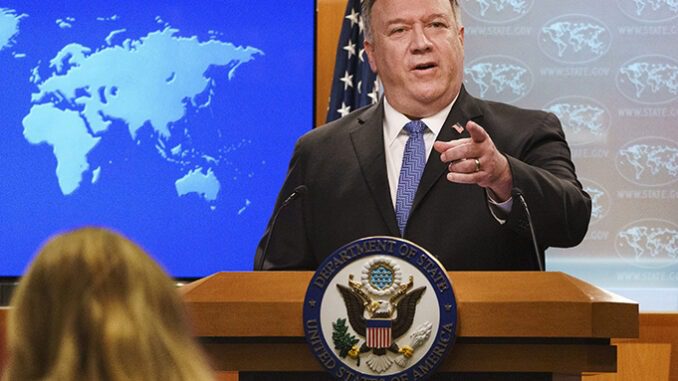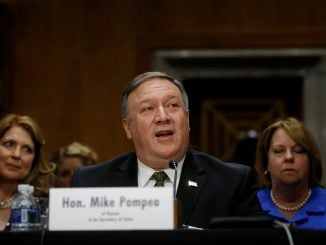
WASHINGTON, D.C. — Secretary of State Mike Pompeo announced that the State Department is voiding longstanding restrictions on how U.S. diplomats and others have contact with their counterparts in Taiwan, another move that is expected to upset China as the Trump administration winds to an end.
The Trump administration has sought to strengthen bilateral relations with Taiwan. It announced Thursday that U.N Ambassador Kelly Craft would go to Taiwan, a move that sparked sharp criticism from Beijing and a warning that the U.S. would pay a heavy price. In August, Health and Human Services Secretary Alex Azar became the first Cabinet member to visit Taiwan since 2014.
Pompeo said that the State Department has created complex restrictions when it comes to contacts between the two parties. He said those actions were taken to appease the Communist regime in Beijing.
“No more,” Pompeo declared in a statement. “Today I am announcing that I am lifting all of these self-imposed restrictions.”
Kelly Craft will visit Taipei, the island’s capital, on Jan. 13-15. The U.S. Mission to the United Nations said the visit would “reinforce the U.S. government’s strong and ongoing support for Taiwan’s international space.”
The Chinese government maintains that mainland China and Taiwan are parts of “one China.” China has been stepping up its threats to bring the self-governing island by military force with frequent war games and aerial patrols. It has been using its diplomatic clout to stop Taiwan from joining any organizations that require statehood for membership.
Pompeo said the U.S. maintains relationships with unofficial partners around the world, and Taiwan is no exception.
“Our two democracies share common values of individual freedom, the rule of law, and a respect for human dignity,” Pompeo said. “Today’s statement recognizes that the U.S.-Taiwan relationship need not, and should not, be shackled by self-imposed restrictions of our permanent bureaucracy.”
Taiwan Foreign Minister Joseph Wu welcomed the move.
“I’m grateful to @SecPompeo & @StateDept for lifting restrictions unnecessarily limiting our engagements these past years,” Wu said in a retweet of a Pompeo tweet about the announcement.
“The closer partnership between #Taiwan & the #US is firmly based on our shared values, common interests & unshakeable belief in freedom & democracy,” he wrote, drawing a distinction with China’s authoritarian one-party state.
The trip is a “symbol of the solid friendship between Taiwan and the U.S, and will positively help and deepen the U.S.-Taiwan partnership,” the spokesperson said.
In announcing the trip, Pompeo said he was sending Craft to show “what a free China could achieve.” Taiwan’s official title is the Republic of China, the name of Chiang Kai-shek’s Nationalist Party government that he moved to Taiwan in 1949 as Mao Zedong’s Communists swept to power on mainland China.
China continues to regard Taiwan as part of its territory to be recovered by force if necessary.
The visit is yet another move from the Trump administration to step up interactions with the island despite their lacking formal diplomatic ties since Washington switched recognition from Taipei to Beijing in 1979. The U.S. outreach to Taiwan has exacerbated tensions between Washington and Beijing that are already running high over the COVID-19 pandemic, trade, Hong Kong and the South China Sea.
Craft was appointed by President Donald Trump to the position in 2019, and is due to be replaced by career diplomat Linda Thomas-Greenfield after Biden takes office.
In defiance of China’s warnings, Congress and the Trump administration have pushed for more visits by sitting government officials, along with arms sales and political support. Secretary of Health and Human Services Alex Azar visited in August, followed the next month by Under Secretary of State Keith Krach.
China stepped up its angry rhetoric and flew fighter jets near the island in a display of force during both visits.
Heightened tensions with China present a diplomatic challenge for Biden, who is expected to maintain many of Trump’s policies toward Beijing while seeking to put relations on a more predictable, less confrontational track.
While Beijing has called for improved relations, it refuses to back down on issues such as Taiwan that it considers to be among its “core interests.”
Chinese Foreign Ministry spokesperson Hua Chunying on Friday said a “handful of anti-China politicians within the Trump administration, to be clear, such as Pompeo, have been staging a show of madness as their days at the reins are numbered, stopping at nothing to deliberately sabotage China-U.S. relations for selfish political interests.”
“China will take all necessary measures to safeguard its sovereignty and security interests,” Hua told reporters at a daily briefing. “If the U.S. insists on going its own way, it will definitely pay a heavy price for its erroneous actions.”



